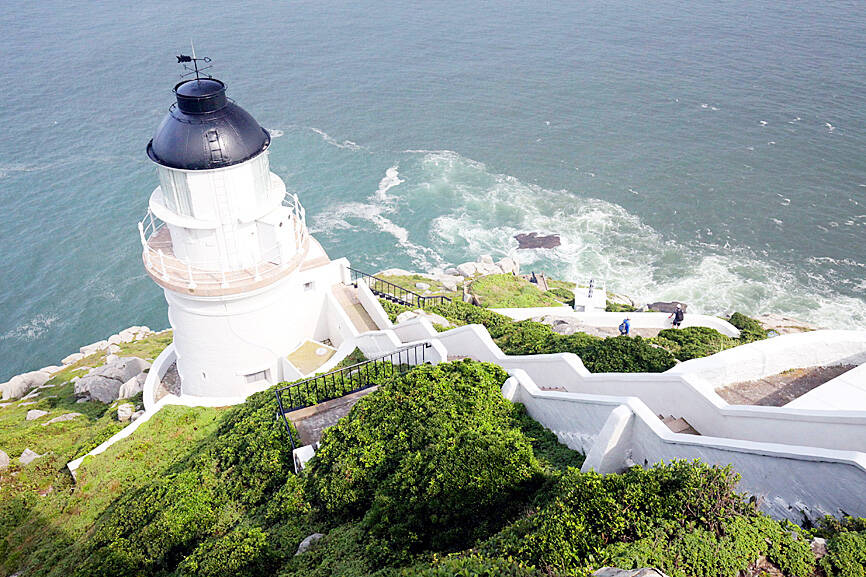China has lifted restrictions on group and independent travel to Lienchiang County for Chinese-controlled Fujian Province residents, a source familiar with the matter said on Thursday.
The Exit-Entry Administration Bureau of Shanghai resumed processing exit visa applications for those traveling to Matsu on Thursday, the source said.
Fujian residents and holders of Fujian residence permits can apply for a single-entry personal or group travel visa to Lienchiang, the source said, adding that the visa is valid for six months and is annotated for direct travel to Lienchiang only.

Photo courtesy of the Maritime and Port Bureau
Tour guides from travel agencies that are authorized to organize tours to Taiwan can apply for a multi-entry group travel visa to Lienchiang, with a validity of up to one year, the source said.
Fujian residents who obtain the correct documentation can enter and exit the Chinese border through Huangqi or Mawei ports in Fuzhou, the source said, adding that they would be able to take cross-strait ferry services under the “small three links.”
Regarding the length of their stay, the source said under Taiwan’s entry policies, Chinese visitors can stay for up to 15 days.
Eight Fujian tourists were to arrive in Matsu yesterday and stay for about five days, Lienchiang County Association of Travel Agents chairman Yang Yao-chih (楊曜誌) said.
The eight tourists were approved by the Chinese authorities to travel to Lienchiang under individual travel visas and no Chinese tour guide would accompany them, but they are to join a guided group during their visit, Yang said.
Chinese tourism to Taiwan had been largely frozen for more than three years. China halted independent travel to Taiwan on Aug. 1, 2019, citing the poor state of cross-strait relations. It then suspended group travel to other countries, including Taiwan, in early 2020, when the COVID-19 pandemic began.
In a written reply, the Mainland Affairs Council said that it was pleased to see the Chinese authorities announce the resumption of applications for Fujian residents to travel to Matsu for group and individual travelers.
“The government’s stance of welcoming Chinese tourists to visit Matsu, Kinmen or Taiwan remains unchanged,” the council added.

The High Prosecutors’ Office yesterday withdrew an appeal against the acquittal of a former bank manager 22 years after his death, marking Taiwan’s first instance of prosecutors rendering posthumous justice to a wrongfully convicted defendant. Chu Ching-en (諸慶恩) — formerly a manager at the Taipei branch of BNP Paribas — was in 1999 accused by Weng Mao-chung (翁茂鍾), then-president of Chia Her Industrial Co, of forging a request for a fixed deposit of US$10 million by I-Hwa Industrial Co, a subsidiary of Chia Her, which was used as collateral. Chu was ruled not guilty in the first trial, but was found guilty

DEADLOCK: As the commission is unable to forum a quorum to review license renewal applications, the channel operators are not at fault and can air past their license date The National Communications Commission (NCC) yesterday said that the Public Television Service (PTS) and 36 other television and radio broadcasters could continue airing, despite the commission’s inability to meet a quorum to review their license renewal applications. The licenses of PTS and the other channels are set to expire between this month and June. The National Communications Commission Organization Act (國家通訊傳播委員會組織法) stipulates that the commission must meet the mandated quorum of four to hold a valid meeting. The seven-member commission currently has only three commissioners. “We have informed the channel operators of the progress we have made in reviewing their license renewal applications, and

‘DENIAL DEFENSE’: The US would increase its military presence with uncrewed ships, and submarines, while boosting defense in the Indo-Pacific, a Pete Hegseth memo said The US is reorienting its military strategy to focus primarily on deterring a potential Chinese invasion of Taiwan, a memo signed by US Secretary of Defense Pete Hegseth showed. The memo also called on Taiwan to increase its defense spending. The document, known as the “Interim National Defense Strategic Guidance,” was distributed this month and detailed the national defense plans of US President Donald Trump’s administration, an article in the Washington Post said on Saturday. It outlines how the US can prepare for a potential war with China and defend itself from threats in the “near abroad,” including Greenland and the Panama

Taiwan People’s Party (TPP) Chairman Huang Kuo-chang (黃國昌) yesterday appealed to the authorities to release former Taipei mayor Ko Wen-je (柯文哲) from pretrial detention amid conflicting reports about his health. The TPP at a news conference on Thursday said that Ko should be released to a hospital for treatment, adding that he has blood in his urine and had spells of pain and nausea followed by vomiting over the past three months. Hsieh Yen-yau (謝炎堯), a retired professor of internal medicine and Ko’s former teacher, said that Ko’s symptoms aligned with gallstones, kidney inflammation and potentially dangerous heart conditions. Ko, charged with